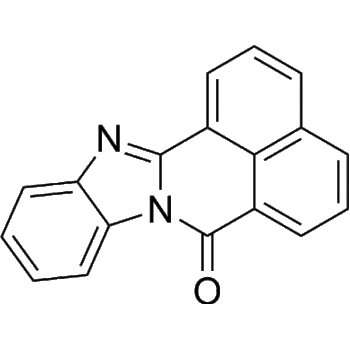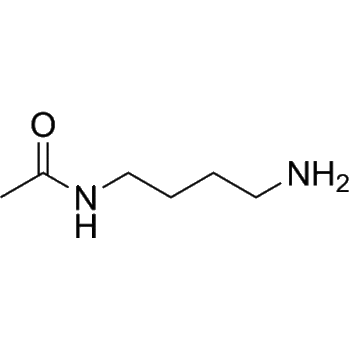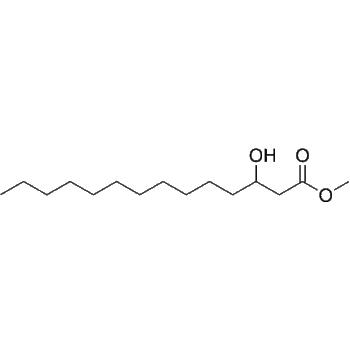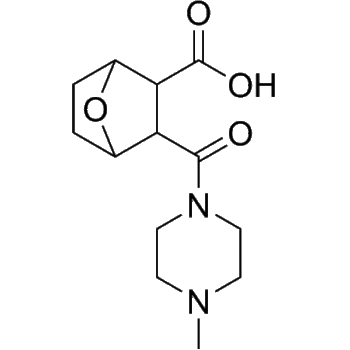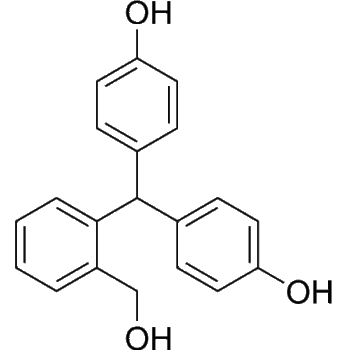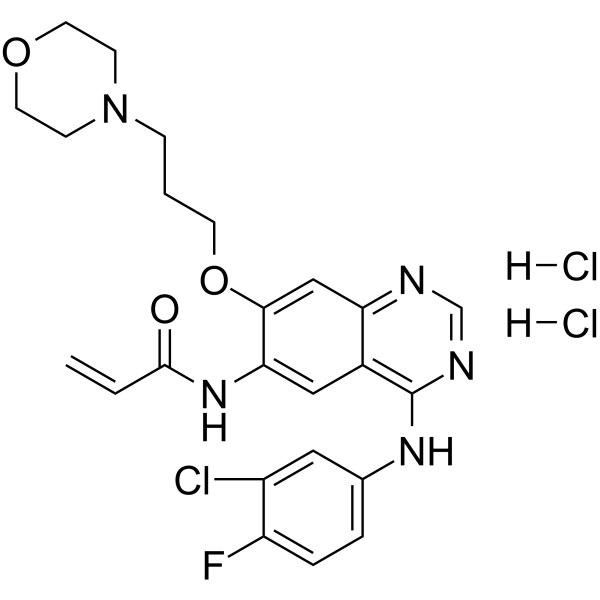
Download Files:
Canertinib (dihydrochloride)
SKU
HY-10367A-10 mg
Category Reference compound
Tags Anti-infection;JAK/STAT Signaling;Protein Tyrosine Kinase/RTK, Cancer; Infection, EGFR;Orthopoxvirus
$38 – $480
Products Details
Product Description
– Canertinib dihydrochloride (CI-1033 dihydrochloride) is a potent and irreversible EGFR inhibitor; inhibits cellular EGFR and ErbB2 autophosphorylation with IC50s of 7.4 and 9 nM. Canertinib dihydrochloride is active against vaccinia virus respiratory infection in mice[1][2][3][4].
Web ID
– HY-10367A
Storage Temperature
– 4°C (Powder, sealed storage, away from moisture)
Shipping
– Room Temperature
Applications
– Cancer-Kinase/protease
Molecular Formula
– C24H27Cl3FN5O3
Citations
– Harvard Medical School LINCS LIBRARY|J Cell Sci. 2015 Sep 1;128(17):3317-29. |Biochemistry. 2017 Jun 13;56(23):2921-2927.|Biochemistry. 2018 Feb 27;57(8):1369-1379.|bioRxiv. 2023 Oct 6.|J Biol Chem. 2012 Mar 23;287(13):9742-52.|J Med Chem. 2019 May 9;62(9):4772-4778.|Oncotarget. 2020 Nov 3;11(44):3921-3932.|Sci Transl Med. 2018 Jul 18;10(450):eaaq1093.
References
– [1]Smaill JB, et al. Tyrosine kinase inhibitors. 17. Irreversible inhibitors of the epidermal growth factor receptor: 4-(phenylamino)quinazoline- and 4-(phenylamino)pyrido[3,2-d]pyrimidine-6-acrylamides bearing additional solubilizing functions. J Med Chem. 2000 Apr 6;43(7):1380-97.|[2]Djerf Severinsson EA, et al. The pan-ErbB receptor tyrosine kinase inhibitor canertinib promotes apoptosis of malignant melanoma in vitro and displays anti-tumor activity in vivo. Biochem Biophys Res Commun. 2011 Oct 28;414(3):563-8.|[3]McAndrews KM, et, al. Mechanisms associated with biogenesis of exosomes in cancer. Mol Cancer. 2019 Mar 30;18(1):52.|[4]Smee DF, et, al. Progress in the discovery of compounds inhibiting orthopoxviruses in animal models. Antivir Chem Chemother. 2008;19(3):115-24.
CAS Number
– 289499-45-2
Molecular Weight
– 558.86
Compound Purity
– 99.12
SMILES
– C=CC(NC1=CC2=C(N=CN=C2C=C1OCCCN3CCOCC3)NC4=CC=C(C(Cl)=C4)F)=O.[H]Cl.[H]Cl
Clinical Information
– Phase 2
Research Area
– Cancer; Infection
Solubility
– DMSO : 62.5 mg/mL (ultrasonic)|H2O : 25 mg/mL (ultrasonic)
Target
– EGFR;Orthopoxvirus
Isoform
– EGFR/ErbB1/HER1;ErbB2/HER2
Pathway
– Anti-infection;JAK/STAT Signaling;Protein Tyrosine Kinase/RTK
Product type
– Reference compound
Disclaimer: All products are for Research use only unless clearly stated otherwise on the product datasheet. Datasheets provided on the website are drafts for reference purpose only and you are requested to always refer to the hard copy included in the kit for your experimentation. Agdia Products are available for delivery only in Canada.
